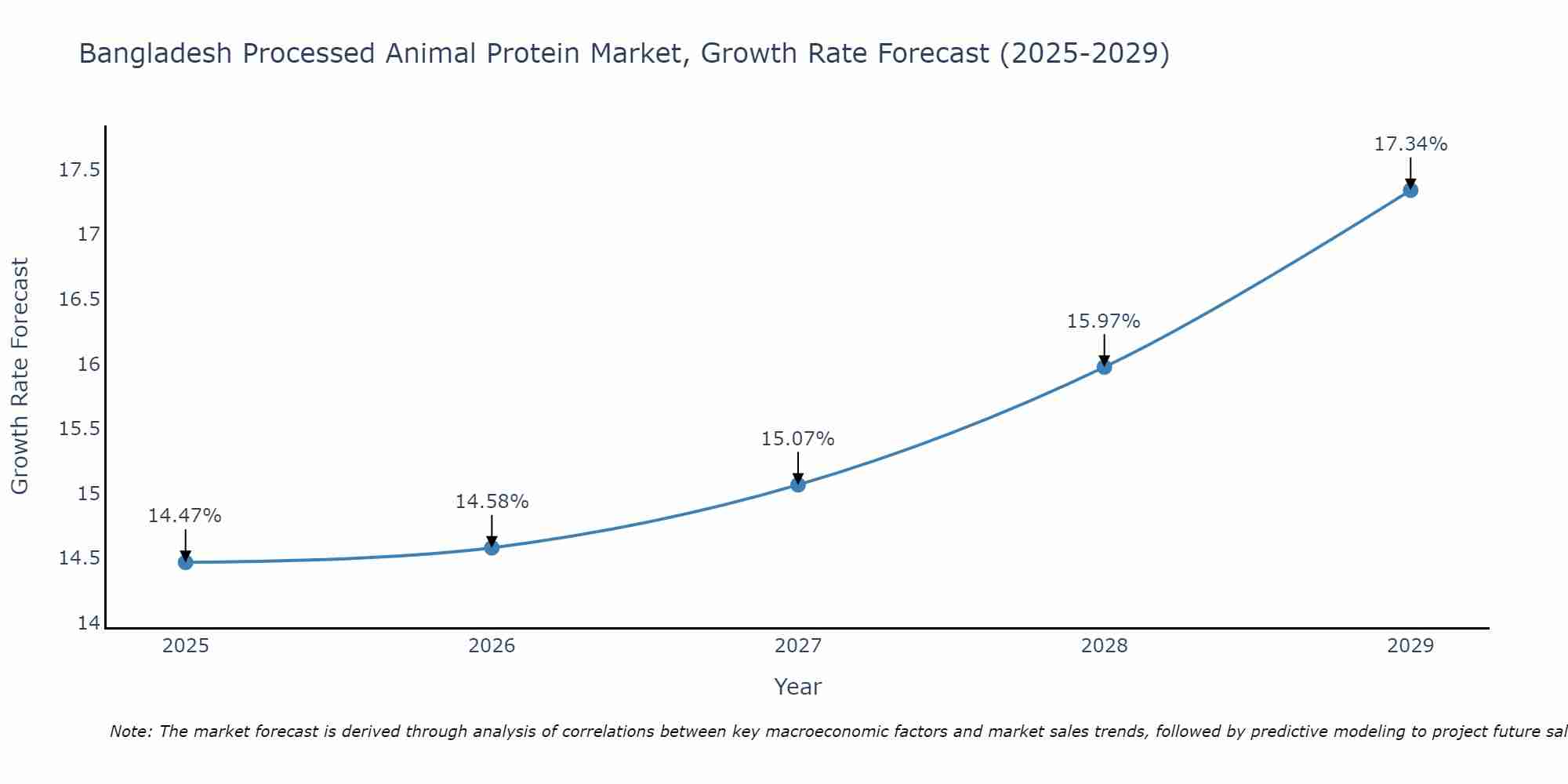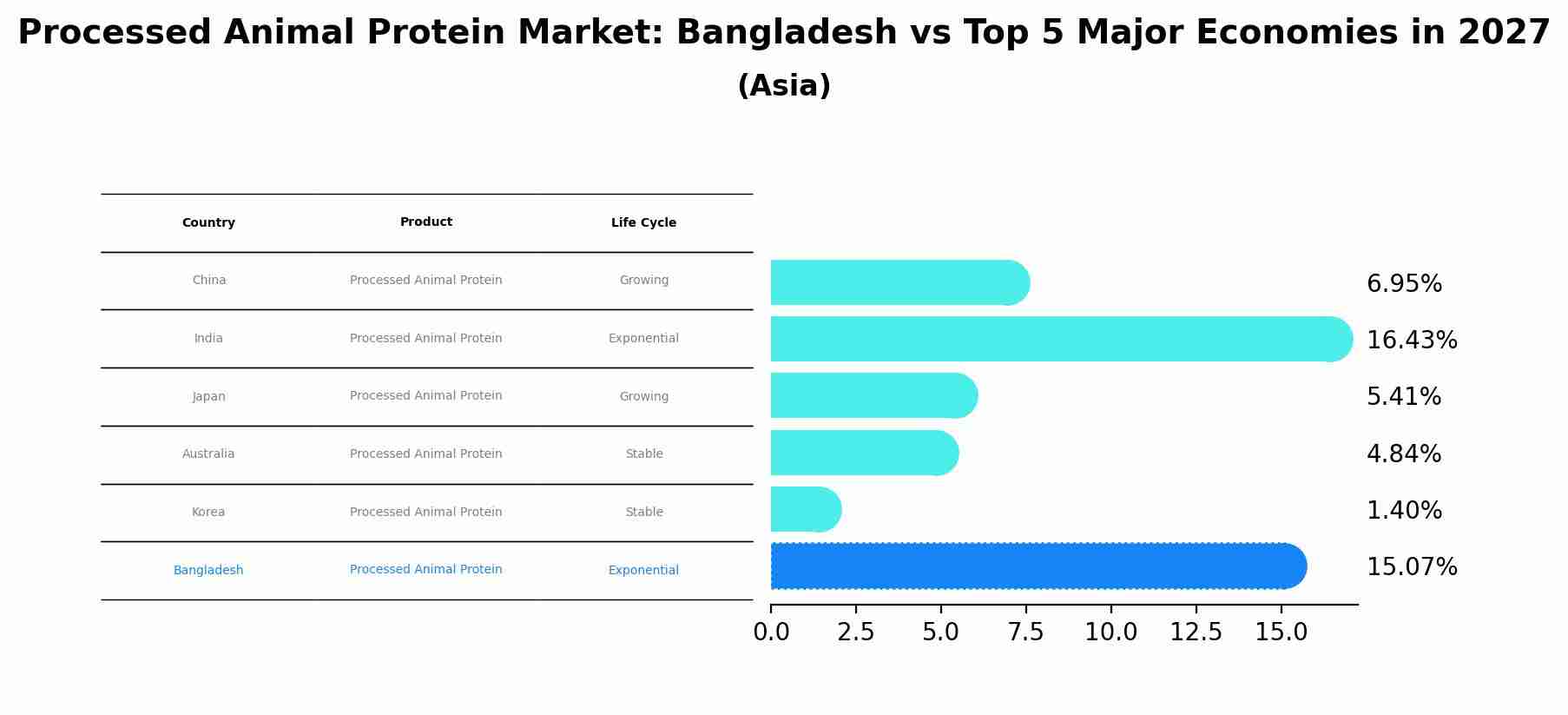Bangladesh Processed Animal Protein Market (2025-2031) Outlook | Analysis, Industry, Forecast, Trends, Share, Value, Size, Companies, Growth & Revenue
| Product Code: ETC411928 | Publication Date: Oct 2022 | Updated Date: Jul 2025 | Product Type: Market Research Report | |
| Publisher: 6Wresearch | Author: Sumit Sagar | No. of Pages: 75 | No. of Figures: 35 | No. of Tables: 20 |
Bangladesh Processed Animal Protein Market Size Growth Rate
The Bangladesh Processed Animal Protein Market is poised for steady growth rate improvements from 2025 to 2029. From 14.47% in 2025, the growth rate steadily ascends to 17.34% in 2029.

Processed Animal Protein Market: Bangladesh vs Top 5 Major Economies in 2027 (Asia)
In the Asia region, the Processed Animal Protein market in Bangladesh is projected to expand at a exponential growth rate of 15.07% by 2027. The largest economy is China, followed by India, Japan, Australia and South Korea.

Bangladesh Processed Animal Protein Market Synopsis
The Bangladesh processed animal protein market is witnessing steady growth due to increasing consumer awareness about the benefits of protein consumption and changing dietary preferences. The market is primarily driven by the rising demand for processed meat products such as sausages, nuggets, and canned meats among the urban population. Additionally, the growing food industry and the increasing number of quick-service restaurants are further fueling the market growth. However, challenges such as limited cold chain infrastructure and concerns regarding food safety and quality standards pose obstacles to market expansion. Overall, with the evolving food habits and lifestyle changes in Bangladesh, the processed animal protein market is expected to continue its growth trajectory in the coming years.
Bangladesh Processed Animal Protein Market Trends
The Bangladesh Processed Animal Protein Market is experiencing a shift towards healthier and more sustainable options, with a growing demand for organic and natural products. Consumers are increasingly seeking products that are free from artificial additives and preservatives, as well as those that are sourced ethically and produced in an environmentally friendly manner. Additionally, there is a rising interest in alternative protein sources such as plant-based proteins, driven by health and environmental concerns. Convenience and ready-to-eat products are also gaining popularity among busy urban consumers. Overall, there is a growing awareness among Bangladeshi consumers regarding the quality and origins of processed animal protein products, leading to a more discerning and health-conscious market landscape.
Bangladesh Processed Animal Protein Market Challenges
In the Bangladesh Processed Animal Protein Market, there are several challenges faced by industry players. These include limited awareness and understanding of processed animal protein products among consumers, especially in rural areas where traditional protein sources are more commonly consumed. Additionally, issues with food safety and quality control regulations pose a challenge for companies operating in this market. Supply chain inefficiencies, such as the lack of proper storage and distribution infrastructure, also impact the availability and affordability of processed animal protein products. Furthermore, competition from alternative protein sources and substitutes, as well as fluctuating input costs, add to the complexities faced by businesses in the Bangladesh Processed Animal Protein Market. Overall, addressing these challenges requires strategic marketing efforts, investment in infrastructure, and adherence to quality standards to drive growth and consumer acceptance in the market.
Bangladesh Processed Animal Protein Market Investment Opportunities
In the Bangladesh Processed Animal Protein Market, there are several investment opportunities for potential investors. One option is to invest in companies that specialize in producing processed meat products such as sausages, burgers, and ready-to-eat meals, as there is a growing demand for convenient and high-quality protein sources in the country. Additionally, investing in poultry or fish processing facilities could be lucrative, as Bangladesh has a significant domestic consumption of poultry and fish products. Another potential opportunity lies in the development of advanced processing technologies to improve efficiency and product quality in the industry. Overall, the Bangladesh Processed Animal Protein Market presents opportunities for investors to capitalize on the increasing consumption of processed protein products in the country.
Jordan Agar Market Government Policies
Government policies in Bangladesh related to the Processed Animal Protein Market focus on ensuring food safety, quality control, and animal welfare. The Department of Livestock Services regulates the production, import, and sale of processed animal protein products to safeguard public health and prevent the spread of diseases. The government has implemented stringent standards and guidelines for processing facilities to maintain hygiene and sanitation practices throughout the supply chain. Additionally, there are regulations in place to monitor the use of antibiotics and other additives in animal feed to prevent harmful residues in the final products. Overall, the government is committed to promoting a safe and sustainable processed animal protein market in Bangladesh through regulatory oversight and enforcement measures.
Bangladesh Processed Animal Protein Market Future Outlook
The future outlook for the Bangladesh Processed Animal Protein Market appears positive, with anticipated growth driven by increasing consumer awareness of the nutritional benefits of animal protein products and rising disposable incomes. The market is expected to witness expansion due to the growing demand for convenient and ready-to-eat protein sources, particularly among urban consumers. Furthermore, the rise in health consciousness and the shift towards protein-rich diets are likely to fuel the demand for processed animal protein products in Bangladesh. However, the market may face challenges related to price sensitivity among some consumer segments and competition from alternative protein sources. Overall, the Bangladesh Processed Animal Protein Market is poised for steady growth in the coming years, presenting opportunities for industry players to innovate and capitalize on evolving consumer preferences.
Key Highlights of the Report:
- Bangladesh Processed Animal Protein Market Outlook
- Market Size of Bangladesh Processed Animal Protein Market, 2024
- Forecast of Bangladesh Processed Animal Protein Market, 2031
- Historical Data and Forecast of Bangladesh Processed Animal Protein Revenues & Volume for the Period 2021 - 2031
- Bangladesh Processed Animal Protein Market Trend Evolution
- Bangladesh Processed Animal Protein Market Drivers and Challenges
- Bangladesh Processed Animal Protein Price Trends
- Bangladesh Processed Animal Protein Porter's Five Forces
- Bangladesh Processed Animal Protein Industry Life Cycle
- Historical Data and Forecast of Bangladesh Processed Animal Protein Market Revenues & Volume By Source for the Period 2021 - 2031
- Historical Data and Forecast of Bangladesh Processed Animal Protein Market Revenues & Volume By Poultry for the Period 2021 - 2031
- Historical Data and Forecast of Bangladesh Processed Animal Protein Market Revenues & Volume By Pork for the Period 2021 - 2031
- Historical Data and Forecast of Bangladesh Processed Animal Protein Market Revenues & Volume By Beef for the Period 2021 - 2031
- Historical Data and Forecast of Bangladesh Processed Animal Protein Market Revenues & Volume By Others for the Period 2021 - 2031
- Historical Data and Forecast of Bangladesh Processed Animal Protein Market Revenues & Volume By Form for the Period 2021 - 2031
- Historical Data and Forecast of Bangladesh Processed Animal Protein Market Revenues & Volume By Dry for the Period 2021 - 2031
- Historical Data and Forecast of Bangladesh Processed Animal Protein Market Revenues & Volume By Liquid for the Period 2021 - 2031
- Bangladesh Processed Animal Protein Import Export Trade Statistics
- Market Opportunity Assessment By Source
- Market Opportunity Assessment By Form
- Bangladesh Processed Animal Protein Top Companies Market Share
- Bangladesh Processed Animal Protein Competitive Benchmarking By Technical and Operational Parameters
- Bangladesh Processed Animal Protein Company Profiles
- Bangladesh Processed Animal Protein Key Strategic Recommendations
Frequently Asked Questions About the Market Study (FAQs):
Export potential assessment - trade Analytics for 2030
Export potential enables firms to identify high-growth global markets with greater confidence by combining advanced trade intelligence with a structured quantitative methodology. The framework analyzes emerging demand trends and country-level import patterns while integrating macroeconomic and trade datasets such as GDP and population forecasts, bilateral import–export flows, tariff structures, elasticity differentials between developed and developing economies, geographic distance, and import demand projections. Using weighted trade values from 2020–2024 as the base period to project country-to-country export potential for 2030, these inputs are operationalized through calculated drivers such as gravity model parameters, tariff impact factors, and projected GDP per-capita growth. Through an analysis of hidden potentials, demand hotspots, and market conditions that are most favorable to success, this method enables firms to focus on target countries, maximize returns, and global expansion with data, backed by accuracy.
By factoring in the projected importer demand gap that is currently unmet and could be potential opportunity, it identifies the potential for the Exporter (Country) among 190 countries, against the general trade analysis, which identifies the biggest importer or exporter.
To discover high-growth global markets and optimize your business strategy:
Click Here- Single User License$ 1,995
- Department License$ 2,400
- Site License$ 3,120
- Global License$ 3,795
Search
Thought Leadership and Analyst Meet
Our Clients
Related Reports
- Saudi Arabia Car Window Tinting Film, Paint Protection Film (PPF), and Ceramic Coating Market (2025-2031) | Strategy, Consumer Insights, Analysis, Investment Trends, Opportunities, Growth, Size, Share, Industry, Revenue, Segments, Value, Segmentation, Supply, Forecast, Restraints, Outlook, Competition, Drivers, Trends, Demand, Pricing Analysis, Competitive, Strategic Insights, Companies, Challenges
- South Africa Stationery Market (2025-2031) | Share, Size, Industry, Value, Growth, Revenue, Analysis, Trends, Segmentation & Outlook
- Afghanistan Rocking Chairs And Adirondack Chairs Market (2026-2032) | Size & Revenue, Competitive Landscape, Share, Segmentation, Industry, Value, Outlook, Analysis, Trends, Growth, Forecast, Companies
- Afghanistan Apparel Market (2026-2032) | Growth, Outlook, Industry, Segmentation, Forecast, Size, Companies, Trends, Value, Share, Analysis & Revenue
- Canada Oil and Gas Market (2026-2032) | Share, Segmentation, Value, Industry, Trends, Forecast, Analysis, Size & Revenue, Growth, Competitive Landscape, Outlook, Companies
- Germany Breakfast Food Market (2026-2032) | Industry, Share, Growth, Size, Companies, Value, Analysis, Revenue, Trends, Forecast & Outlook
- Australia Briquette Market (2025-2031) | Growth, Size, Revenue, Forecast, Analysis, Trends, Value, Share, Industry & Companies
- Vietnam System Integrator Market (2025-2031) | Size, Companies, Analysis, Industry, Value, Forecast, Growth, Trends, Revenue & Share
- ASEAN and Thailand Brain Health Supplements Market (2025-2031) | Strategy, Consumer Insights, Analysis, Investment Trends, Opportunities, Growth, Size, Share, Industry, Revenue, Segments, Value, Segmentation, Supply, Forecast, Restraints, Outlook, Competition, Drivers, Trends, Demand, Pricing Analysis, Competitive, Strategic Insights, Companies, Challenges
- ASEAN Bearings Market (2025-2031) | Strategy, Consumer Insights, Analysis, Investment Trends, Opportunities, Growth, Size, Share, Industry, Revenue, Segments, Value, Segmentation, Supply, Forecast, Restraints, Outlook, Competition, Drivers, Trends, Demand, Pricing Analysis, Competitive, Strategic Insights, Companies, Challenges
Industry Events and Analyst Meet
Whitepaper
- Middle East & Africa Commercial Security Market Click here to view more.
- Middle East & Africa Fire Safety Systems & Equipment Market Click here to view more.
- GCC Drone Market Click here to view more.
- Middle East Lighting Fixture Market Click here to view more.
- GCC Physical & Perimeter Security Market Click here to view more.
6WResearch In News
- Doha a strategic location for EV manufacturing hub: IPA Qatar
- Demand for luxury TVs surging in the GCC, says Samsung
- Empowering Growth: The Thriving Journey of Bangladesh’s Cable Industry
- Demand for luxury TVs surging in the GCC, says Samsung
- Video call with a traditional healer? Once unthinkable, it’s now common in South Africa
- Intelligent Buildings To Smooth GCC’s Path To Net Zero


















